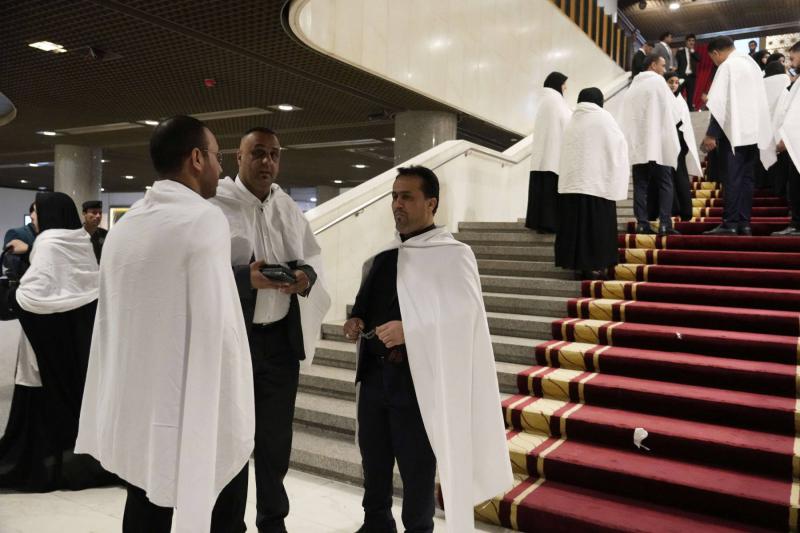The Iraqi political scene is not just a political impasse as analysts and pundits say. It should also be seen as a mediocre comedy, regardless of all its banners, political parties and various protagonists.
The first comedic actors are the intellectuals and writers, who have relentlessly marketed themselves as liberals and democrats, as they tried to restore the lustre of the political process after the October 10 elections.
They pin the blame on those who boycotted the ballot, which was shunned by more than 82 percent of Iraqis.
In the Iraqi experience, elections are but a slapstick comedy where actors occasionally try to recalibrate the political process to keep pace with regional and international changes.
The young liberals’ intellectual approach does not allow them to see beyond their noses, as they cannot accept that change is possible outside the political process, even if all political crises that have occurred since the US invasion and occupation of Iraq were part of that same political process.
The second source of comedic levity are the initiatives announced from time to time by the parties of the “Shia family” as a way to gain time and blot out the nature of the competition over benefits and spoils. Moqtada al-Sadr’s 40-day deadline, was and is still an expression of the dead-end reached by the process of government formation and the monopoly of power under the banner of the majority government.
The deadline was an opportunity to hold negotiations behind the scenes and to allow the intervention of regional and international powers in Iraq’s political power crisis.
As for the Coordination Framework’s initiative, announced on the first day of Eid al-Fitr, there was nothing new. Despite all the spin, its nine points did not contain anything original. A new election law, a new commission, the enactment of the oil and gas law to regulate the relationship between Baghdad and Erbil and the inclusion of the Peshmerga forces in the armed forces ... are only tools that each bloc brings up when the political crisis escalates.
The initiative was nothing more than media fanfare aimed at obscuring the fact that the ultimate aim was to save the share of the largest Shia component in the practical and political sense, after it was legally saved by the Federal Court, which issued a ruling requiring the presence of two-thirds of parliament members to elect the president of the republic.
Sadr's latest initiative is on the other hand the most farcical of all his failed stratagems. It called for tasking independents with forming the government, provided that the Coordination Framework does not participate in it. This is another unsuccessful attempt to buy off the so-called independents and bring them back to the fold, or cut off the road before any attempts by the Coordination Framework.
No less farcical is the visit of Parliament Speaker Muhammad al-Halbousi to Iran a few days ago, in a strange attempt to defuse the political crisis.
Halbousi, who with Sadr and Kadhimi likes to play the tune of the sovereignty and independence of Iraq, travelled to Teheran to beg Iranian mullahs to pressure the crumbling “Shia house” to cede some gains and spoils of power to Sadr and his bloc. Halbousi did not make that visit without the consent of the parties to the Triple Alliance, Sadr, Barzani and Khanjar along with Halbousi himself.
Iraq is going through a transitional phase. The failure of all political initiatives, the formation of the government and the holding of elections reflects the escalation of the conflict between two projects, neither of which could gain the upper hand.
They are the projects aimed at aligning Iraq with the Iranian camp, which calls itself the resistance and rejection camp. It is worth noting in this regard that the bombing of the Green Zone, almost simultaneously with the bombing of the region near Erbil, was as much a message to Kadhimi to stop the Turkish-requested Iraqi army’s attack aimed at removing Turkish Kurdistan Workers Party (PKK) from the city of Sinjar, where they are sheltered by the Popular Mobilisation militias, as it was an attempt to stir up the stagnant water of the domestic political scene.
The second project is Kadhimi’s project. The Iraqi prime minister nearly paid for it with his life, as Rafik Hariri once did. This project is backed by Tripartite Alliance and advocates a return of Iraq to the Arab fold.
Finally, all this screaming and yelling about the Iraqi political impasse can be summed up in a question: was the political situation in Iraq any different before the current impasse and since the formation of the Paul Bremer’s civilian administration in 2003 until the October 2021 elections?
The answer is obvious. One easily comes to the conclusion that what is happening in the political scene is a low-level comedy in the absolute sense of the word. It is a sorry scene on which the curtains should fall.
Source (Click Here)


 RSS Feed
RSS Feed